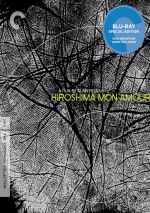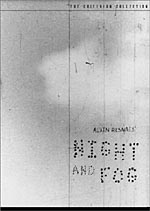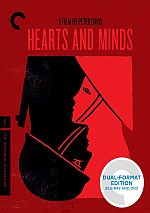|
CRITERION
|

| |
|
MOVIE INFO
|
Synopsis:
A French actress filming an anti-war film in Hiroshima has an affair with a married Japanese architect as they share their differing perspectives on war.
Director:
Alain Resnais
Cast:
Emmanuelle Riva, Eiji Okada, Stella Dassas, Pierre Barbaud, Bernard Fresson
Writing Credits:
Marguerite Duras
MPAA:
Not Rated.
Academy Awards:
Nominated for Best Screenplay.
| |
|
DISC DETAILS
|
Presentation:
Aspect Ratio: 1.37:1
Audio:
French Uncompressed LPCM Monaural
Subtitles:
English
Closed-captioned
Supplements Subtitles:
None
Runtime: 90 min.
Price: $39.95
Release Date: 7/14/2015
Bonus:
• Audio Commentary With Film Historian Peter Cowie
• Interviews with Director Alain Resnais
• Interviews with Actor Emmanuelle Riva
• “Francois Thomas on Hiroshima mon amour”
• “Memory and Meaning: The Music of Hiroshima mon amour” Featurette
• “Revoir Hiroshima” Featurette
• 32-Page Booklet
| |
|
PURCHASE @ AMAZON.COM
|

| |
|
EQUIPMENT
|
Panasonic TC-P60VT60 60-Inch 1080p 600Hz 3D Smart Plasma HDTV; Sony STR-DG1200 7.1 Channel Receiver; Panasonic DMP-BD60K Blu-Ray Player using HDMI outputs; Michael Green Revolution Cinema 6i Speakers (all five); Kenwood 1050SW 150-watt Subwoofer.
| |
|
RELATED REVIEWS
|


| |
|
Hiroshima Mon Amour: Criterion Collection [Blu-Ray] (1959)
|
|
Reviewed by Colin Jacobson (June 25, 2015)
After the horrors of Alain Resnais’ documentary Night and Fog - with its images of Nazi concentration camps – I thought I’d get off easier with his first feature film, 1959’s Hiroshima mon amour. Through the movie’s stark but sensual opening shots of two bodies intertwined, I figured this love story might avoid the unpleasantness of Fog.
For the most part, I was correct, though the picture went through some similarly unpleasant moments. The movie begins with an argument between the two off-screen lovers. The woman insists that she saw sights of devastation and grotesqueness in Hiroshima following the detonation of the atomic bomb there, while the man claims that she witnessed none of this. While the debate, the flick shows us what she describes, and that includes deformed and physically marred people.
Soon we meet the lovers in bed together: a French actress (Emmanuelle Riva) who came to Hiroshima for a film and a Japanese architect who also fought in the war (Eiji Okada). Apparently the pair just met and got it on anonymously, and the movie shows them as they get to know each other and discuss their recollections of the destruction of the city.
However, it’s her last day in Hiroshima, so they have little time together. He wants to see her again before she leaves, but she declares a refusal to do so. However, he tracks her down on the movie set and they continue to chat as he attempts to convince her to stay in Hiroshima a little longer.
Though she resists heavily, he finally gets her to spend more time with him. Soon we learn both are married to others, but their passion for each other seems strong. He learns more about her issues when she goes into a nearly hypnotic state and reveals the forbidden love she enjoyed with a German soldier back in Nevers, France, at the end of the war.
The film clearly emphasizes the character of the woman, which seems like both a strength and a weakness. On one hand, the architect does little other than enable the actress to tell her tale. His role seems to exist mostly to declare his love for her and to get more details of her life out of her.
Since he really has little to do, Okada brings surprising depth to the part. He makes the architect seem more full-blooded than he might appear on the page; though we don’t know much about him, we buy his obsession with the actress and his attempts to elicit more from her.
For the most part, Hiroshima remains Riva’s movie, though, and she presents a fairly dazzling performance. Variously aloof or sensual or playful or frighteningly lost in painful memories, the actress clearly comes as damaged goods, and Riva seems unafraid to make us sense her interior agony. The character remains something of an enigma, but Riva brings nice emotional complexity to the part.
Alternately lovely and horrible, Resnais brings across the ambivalence of the post-war world well. Despite the occasionally terrible sights, he makes the photography a masterpiece of framing and composition. With the exception of the unpleasant documentary images, virtually every image in the film comes across like a mini piece of art.
That makes the impact of the emotional dilemmas all the more effective, as they play against such sumptuous photography. Occasionally stark, periodically romantic, sometimes atrocious, the film always presents a strongly compelling sense of visual identity.
I went into Hiroshima mon amour with little sense of what to expect. In it I found a surprisingly involving and non-linear tale that avoids simple resolutions and easy answers. The movie doesn’t feature a great plot or concise characters, but it provides a great sense of intrigue and emotional depth along with some of the most effective cinematography I’ve seen.
|
The Blu-ray Grades: Picture B/ Audio C+ / Bonus B
|
|
Hiroshima mon amour appears in an aspect ratio of 1.37:1 on this Blu-ray Disc. The image seemed more than satisfactory.
Sharpness worked well for the most part. Occasional slightly soft shots materialized, but these remained minor, so the majority of the movie seemed accurate and concise. In addition, I saw no problems connected to jagged edges or moiré effects, and edge enhancement seemed to be absent. Grain appeared natural.
When print flaws appeared, these appeared related to historical footage. I noticed no concerns during the shots of the lovers and other images clearly created expressly for Hiroshima. Some of the film of Hiroshima and its victims displayed moderate signs of defects like specks, grit, and lines, but these scenes comprised a relatively minor portion of the film, and the flaws created no real distractions.
The black and white image looked well rendered. Dark tones appeared deep and dense, and contrast generally seemed nicely delineated. Low-light shots were clean and properly visible, as they lacked any excessive darkness and looked natural. The transfer held up well.
The uncompressed LPCM monaural soundtrack of Hiroshima mon amour seemed less satisfying, but it remained acceptable. Speech often came across as somewhat rough and sibilant. I don’t believe any intelligibility issues arose, but the lines were a bit thicker than I’d like. I suspect most – if not all – of the dialogue was looped, and not looped in an especially natural manner.
Effects played a minor role in the film. Though they were somewhat tinny and trebly, they remained acceptably accurate. Music was a more important factor, but the score showed some of the same concerns as the rest of the audio.
The music seemed moderately tinny and without much breadth. Light hiss cropped up at times, but that wasn’t a major issue. Given the vintage of the material, the audio for Hiroshima still appeared solid enough for a “C+”, but it displayed a series of minor concerns.
How does the Blu-ray compare to the Criterion DVD from 2003? Audio showed a bit more range, while visuals appeared tighter and smoother. The picture became the primary improvement here.
The Blu-ray mixed old and new supplements, and these launch with an audio commentary from film historian Peter Cowie. A frequent contributor to Criterion presentations, Cowie offers a typically complete track. He goes over interpretation of the film, elements of its composition and creation, biographical notes for Resnais and others in the production, various story points, and many other issues.
Cowie presents the material in a concise and well-considered manner, and he never seems excessively dry or pedantic. Cowie’s commentary gives us a nice perspective on the film and it genuinely adds to the experience.
Next we get information from some of the film’s main participants. In the Alain Resnais Interviews we find two separate pieces with the director. “Cinepanorama” lasts five minutes, 43 seconds and comes from 1961, while 1980’s “Le Cinema des cineastes” runs 10 minutes, 52 seconds.
The first seems quirkily entertaining, mostly because it follows the hipster mode where Resnais doesn’t really tell us much and we hear pretentious queries like “Is the cinema alive, dead, or about to be born?” The 1980 piece seems more helpful. The interviewer is long-winded, but at least Resnais offers some concrete information, especially as he traces the early evolution of Hiroshima.
The following section provides two Emmanuelle Riva Interviews. The actress first appears in a five-minute and 42-second clip from 1959. The second and longer piece stems from 2003 and lasts 19 minutes and 20 seconds.
As proof that this kind of interview never changes, Riva tells us little in the first one. She starts with a recap of her character and the movie’s plot and then gives us some bland comments about her hoped-for future career and experiences on Hiroshima.
In the 2003 piece, however, Riva proves more illuminating. She goes over how she got cast in her role and provides useful anecdotes about working on the film. She reflects on parts of it as well as its overall legacy. All in all, the newer interview seems helpful and informative.
The next three components are new to the 2015 Blu-ray. Francois Thomas on Hiroshima mon amour runs 26 minutes, 22 seconds and features the thoughts of the film scholar. He discusses the film’s genesis as well as the screenplay, aspects of the dual French/Japanese production, locations, cast and crew, photography, themes and stylistic choices, music, editing, and similar topics. Thomas covers a ton of ground in a fairly brief amount of time and turns this into a tight, terrific take on the film.
Memory and Meaning: The Music of Hiroshima mon amour lasts 10 minutes, 12 seconds and includes notes from USC music/journalism professor Tim Page. He chats about the movie’s score and related areas. Page adds to our understanding of the musical choices.
The disc ends with the 11-minute, 15-second Revoir Hiroshima. This looks at the film’s restoration and presents notes from L’Immagine Ritrovara director Davide Pozzi and cinematographer Renato Berta. As expected, they tell us about the methods used to bring the film up to snuff. It’s somewhat self-congratulatory but it can be interesting at times.
Finally, the package includes a 32-page booklet. Film critic Kent Jones writes about the movie’s making and its legacy, and we also find a 1959 round-table discussion about Hiroshima with Eric Rohmer, Jean-Luc Godard, Jacques Doniol-Valcroze, Jean Domarchi, Pierre Kast, and Jacques Rivette. As usual, this is a terrific package of text, though it loses some components from the 2003 DVD’s booklet. (The Blu-ray also drops an isolated music/effects track and some “screenplay annotations”.)
A subtle and moving effort, Hiroshima mon amour creates an effective examination of people and place mostly via its sublime visuals. Really more of an impressionistic piece than a traditional film, Hiroshima winds its way through its minor plot with effortless beauty. The Blu-ray offers very good picture as well as acceptable audio and some informative supplements. Hiroshima gives us a memorable experience.
To rate this film, visit the DVD review of HIROSHIMA MON AMOUR
|
|

